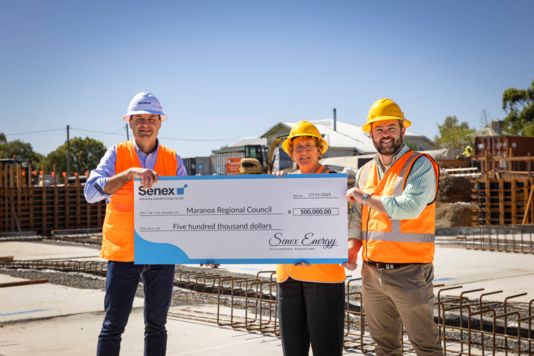Case study:
Through a partnership with Senex, Trevor Kehl has tapped a large and long-term water supply that has transformed his property, 40 minutes’ drive from Roma.
“It’s more than a lifeline, it’s like winning the lotto for a farmer,” Trevor said.
“If you’ve got rain, you’ve got food. Now, we’ve got rain on command and we’ve got feed for our cattle.”
His property is the site of Senex’s Roma North Irrigation Project.
The irrigation scheme uses water produced from Senex’s natural gas wells at the Roma North project to irrigate more than 100ha of pasture that Trevor uses to feed his cattle.
Under the 10-year agreement, Senex has installed pipelines and irrigation equipment, including three centre pivots, to provide up to one megalitre a day to the property.
To ensure maximum crop yield the soil’s chemistry is studied with electromagnetic surveys and the soil is tested every six months by an expert adviser. Water quality is routinely monitored.
For Trevor, summer and winter crops of Rhodes grass and forage barley have increased the quality, number and sale price of his breeder cattle.
“If you quickly do the sums, you work on four head per hectare, so that’s a lot of cattle that we can feed,” Trevor said.
“In a dry land situation, we’d sell the cattle progeny straight off mum at their peak of around 200 to 250 kilos.
“Now we’re retaining those cattle and we’re putting another 200 kilos on them so that’s a win-win for us. It’s more turnover and more money.”
For Senex, the agreement means more than 80 per cent of water produced from Roma North is beneficially used, avoiding significant waste and energy production.
Senex Managing Director and CEO Ian Davies said he was extremely proud of the relationship and results.
“We’re beneficially using the produced water from our natural gas development so that Trevor can increase
crop yields and increase feed for his cattle. It’s a win-win all round,” Ian said


